TGCF 1×6 Review: Lost Crescentian
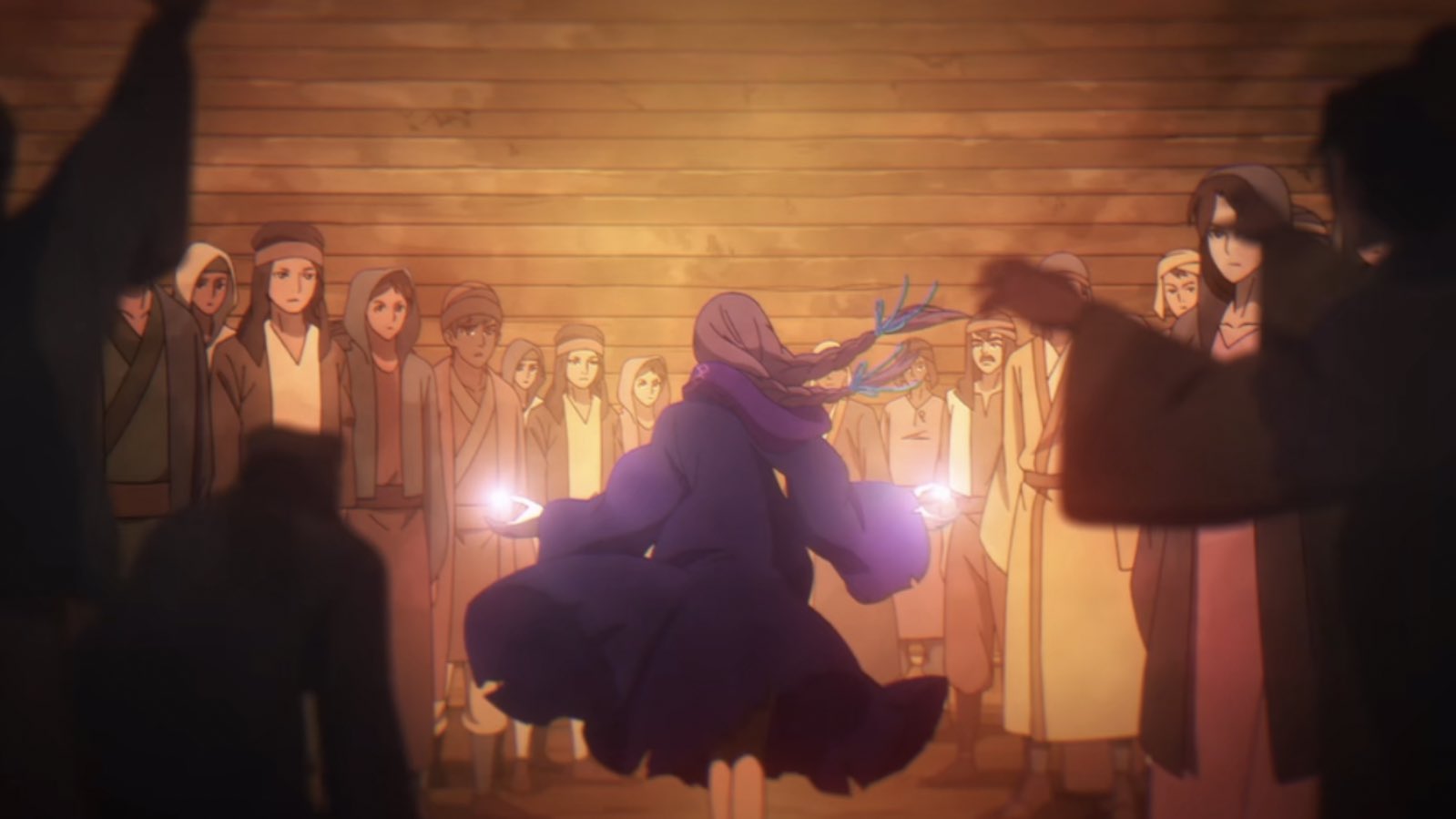
‘Lost Crescentian’ has started us down what book fandom has dubbed the ‘Banyue arc,’ and it’s an incredibly promising adaption so far!
First of all, as usual, I want to talk about the translation so that donghua-only fans and book readers are all on the same page while we discuss the story. Us book-readers call this the ‘Banyue’ arc because fan translators chose to keep that phrase, similar to how they kept ‘Puji’ as ‘Chestnut’ that I discussed in the previous episode. ‘Banyue’ means ‘crescent,’ so whenever ‘crescent’ is mentioned, we’re talking about all things Banyue. So ‘Lost Crescentian’ is literally ‘Lost Banyue.’ So welcome to the Banyue arc, everyone!
I don’t mind these translation choices, as I think the fan translators chose to keep the Chinese pinyin for stylistic reasons, but it makes sense to translate them to English, too. This isn’t a ‘gege’ situation, where there isn’t a good English equivalent, so we keep it as is in fandom and just have to deal with whatever choice the translators make with it. Nor is this a ‘Black Immor’ situation, where the translation is completely inexplicable and I chose to outright reject it.
That said, I may swap back and forth, so put the word ‘Banyue’ in your vocabulary now. Besides, ‘Banyue’ is a very pretty sounding word! It’s just super pleasing to the ears.
All of this is important because the main point of ‘Lost Crescentian’ is to find the Kingdom of Banyue. This is located in a region out in the desert (the Gobi, if we’re keeping with real Chinese geography, though this is a fantasy world with fake places, so do with that what you will). Banyue fell apart about 200 years ago during a clash with a nearby hostile kingdom. It has now become the place of legends and is rumored to be haunted. The strange happenings around Banyue have led to numerous disappearances over the years, making bands of travelers wary of getting too close to the ruins of the kingdom.
 These disappearances are what brought the weird mystery man from the conclusion of the last episode to Xie Lian’s door. Xie Lian and San Lang take the stranger in to interrogate him, leading to a delightful sequence of events that show just how in sync San Lang and Xie Lian have become with each other despite their incredibly short amount of time together. San Lang communicates his suspicions about the man to Xie Lian with just a single look, and Xie Lian agrees.
These disappearances are what brought the weird mystery man from the conclusion of the last episode to Xie Lian’s door. Xie Lian and San Lang take the stranger in to interrogate him, leading to a delightful sequence of events that show just how in sync San Lang and Xie Lian have become with each other despite their incredibly short amount of time together. San Lang communicates his suspicions about the man to Xie Lian with just a single look, and Xie Lian agrees.
They test the mystery man with water, which he is unable to drink as he has no internal organs. He’s just a ‘puppet,’ not a real human. Once his true nature is revealed, the puppet goes into attack mode and lunges at Xie Lian. But Xie Lian is a Martial God, so he easily flicks the weapon away and engages in some hand to hand combat with the creature. Sometimes it’s easy to forget that Xie Lian is a Martial God as he’s so graceful and seemingly delicate, but his combat prowess is what caught the eye of the Heavenly Emperor, as explained back in episode one.
It’s here where San Lang enters the battle. He weaponizes a chopstick and pins the puppet to the floor before he can escape the shrine. This causes the puppet to deflate and create a huge gross mess on the floor. With this action, San Lang has now revealed himself to be not just an incredibly knowledgeable youth, but a highly skilled one as well. While Xie Lian’s expression clearly conveys that he’s impressed by the action, he doesn’t question it and instead focuses on the Banyue situation.
After the encounter with the puppet, Xie Lian enters the Communication Array (Telepathic Matrix) to get more information on Banyue, but he stumbles into a party-like atmosphere that is less than interested in hearing him talk about some cursed city in the desert. The Wind Master, Shi Qinqxuan, is spreading thousands of merits around the Array like confetti and everyone is too preoccupied with grabbing some merits of their own to pay him much mind.
If you haven’t caught on to how merits function, they are basically heavenly currency. The more prayers you answer and the more incense is burned in your honor, the more merits you receive. This is why Xie Lian was given the Ghost Bride assignment in episode one – he would earn all the merits from the worshipers for that incident if he resolved the case so he could pay back his debt to Feng Xin and Mu Qing. Our Xie Lian has been out of Heaven for a long time, so he’s fairly broke in this regard.
Despite this, he shows little interest in catching the Wind Master’s merits and would rather focus on the Banyue situation. Nobody else cares, though, and our Xie Lian is once again ignored by his fellow Heavenly Officials. The only one to give him any advice on Banyue is Ling Wen, who simply tells him to stay out of it. That’s not Xie Lian’s nature, though. He leaves the Array with not much more information than when he’d entered it, but no less determined to finish the job.
When Xie Lian returns to the shrine, he and San Lang continue their discussion about Banyue, but their conversation is soon crashed by Fu Yao and Nan Feng. Once again, they have ‘volunteered’ to help Xie Lian, but nobody really seems happy about the situation. Xie Lian doesn’t have his own spiritual energy (mana), so he needs some assistance on these missions, so he accepts their help even if things are a bit awkward.
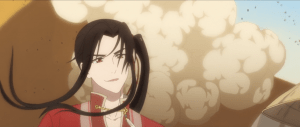
When San Lang, Fu Yao, and Nan Feng are thrown together on this mission, there’s clearly tension between them. San Lang is an absolute little sh*t to them and I love every minute of it. He easily dodges Fu Yao’s attacks and casually insults their intelligence and abilities at every turn. These moments leave me cackling so hard I’m genuinely sent into coughing fits. These moments translate to animation so well! Again, thank you to Haoliners for this fantastic adaption. We are truly blessed by how you’ve chosen to adapt the book.
One has to wonder what Fu Yao would have done if San Lang hadn’t been able to dodge his attack and he’d killed some poor mortal kid on their mission. I suppose Fu Yao was confident that this strange red-clad youth would be able to dodge and he wouldn’t have to deal with any messy consequences from shooting a mortal in the head with his energy blast. Then again, we’ve seen Gods do some pretty terrible things, so maybe there wouldn’t have been severe consequences anyway.
But whatever the case, San Lang dodges it and continues to pester Fu Yao and Nan Feng during their desert adventures. This constant needling of the two Gods by San Lang brings me so much delight. It’s one of my favorite things about ‘Lost Crescentian’ overall.
While Xie Lian is no longer testing San Lang, there clearly isn’t nearly as much trust coming from Fu Yao and Nan Feng. They see how weird San Lang is and set about their own series of tests. They first test him with a water laced with a potion that would theoretically reveal someone’s true form if they were shape shifting. San Lang pushes the drink back at them repeatedly, but when assured by Xie Lian that it’s not poison, he drinks it quickly and tosses the bottle aside.
They then attempt to test him with a ghost-detecting sword, which is promptly mysteriously broken within its sheath before it can have a chance to do its work. At this point, their suspicions have only increased, but before they can do anything else the group is distracted by a sudden wind storm and two mysterious figures running distantly in the desert.
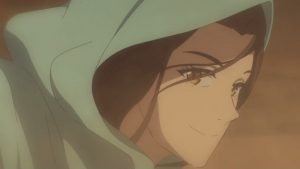 ‘Lost Crescentian’ introduces a lot of new elements, including locations, concepts, and characters. But with this particular set of characters, I’m stuck in a fairly difficult situation. While the book-readers are absolutely losing their minds at the introduction of these two women running in the desert, there isn’t nearly enough information for me to say anything else about them that wouldn’t be a spoiler to the donghua-only people. I try to keep these reviews readable for both crowds, but these two put me in a difficult position.
‘Lost Crescentian’ introduces a lot of new elements, including locations, concepts, and characters. But with this particular set of characters, I’m stuck in a fairly difficult situation. While the book-readers are absolutely losing their minds at the introduction of these two women running in the desert, there isn’t nearly enough information for me to say anything else about them that wouldn’t be a spoiler to the donghua-only people. I try to keep these reviews readable for both crowds, but these two put me in a difficult position.
I guess I’ll just invite the book-readers to follow me over on Twitter where we can lose our minds together and keep this review safe for the donghua-only crowd! I want to scream, too, but I’ve got to keep these reviews as spoiler free as possible. Once the donghua opens up about them, I’ll scream in a spoiler-free way here as well.
The desert-wandering sequence of ‘Lost Crescentian’ does, however, introduce another character that I can openly discuss because San Lang lays out her history fairly thoroughly through monologue earlier in the episode. The character I can talk about freely is the Guoshi of Banyue, which is translated as the ‘Evil Crescent Taoist.’ This isn’t a great translation. A ‘Guoshi’ is more of a teacher, but at a high kingdom-level capacity. They aren’t inherently evil, so I’m not sure why this particular translation was used as there are other Guoshi characters in the story that will need to be translated differently at a later time. This is going to be a problem in regards to consistency.
The Banyue Guoshi was seen as a traitor to her people for opening the gates of the city during an attack. Perhaps this is why they chose to go with the ‘Evil Taoist’ translation for her. Or perhaps it’s because she knew sorcery that was fairly uncommon in the region and was somewhat disturbing to the citizens of Banyue. Either way, this is a weird choice and I’m not entirely sold on it. But I digress. I know I’m being unreasonably pissy about translations again here, so I’ll move on.
The stand out moment of this whole desert wandering sequence of ‘Lost Crescentian’ is the hat catching scene. Oh. My. God. This scene has killed me dead and I can’t get over it. I’ve watched it at least 50 times in the last 24 hours and I’m not even ashamed about it.
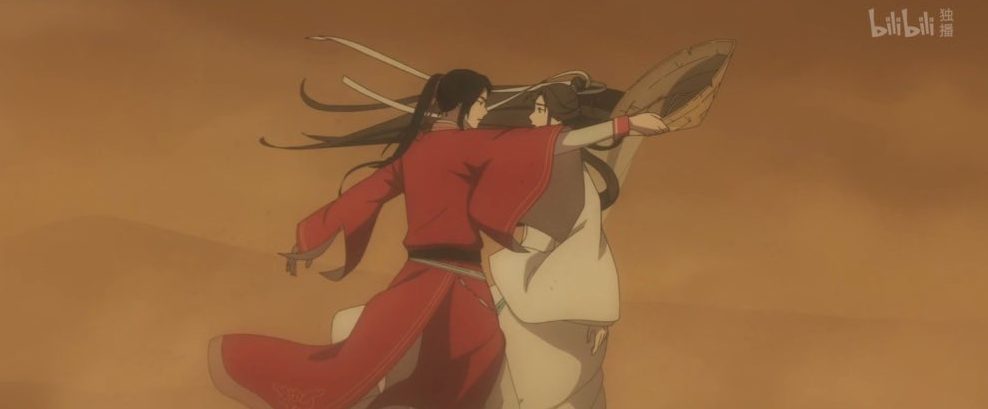
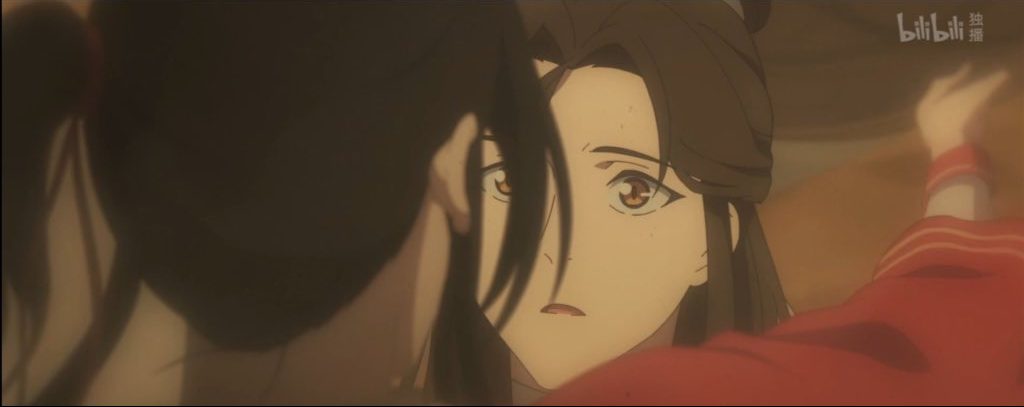
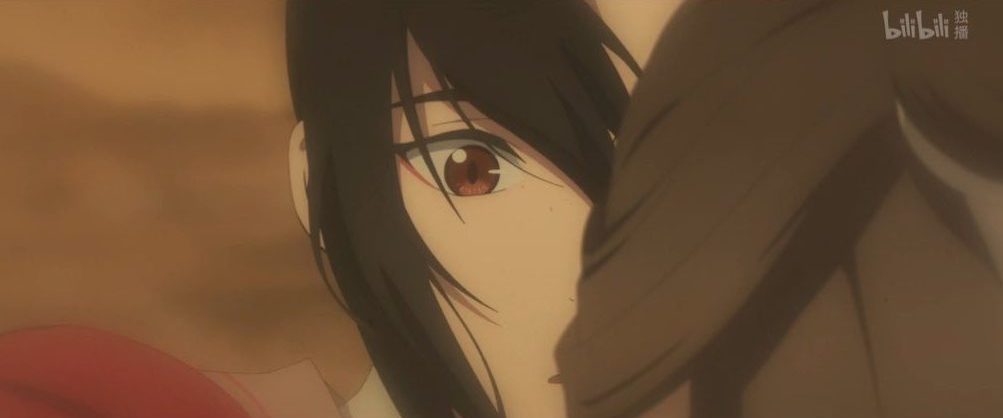
Look, you guys, this scene was not nearly as soft and meaningful in the Heaven Official’s Blessing book. It was there, but it was barely a paragraph long and didn’t have nearly as much impact. The following excerpt is from a fan translation of the novel and shows how this scene played out in a way more subdued fashion:
Just then, a powerful gust whipped by, blowing off Xie Lian’s bamboo hat. If it flew off, it would disappear in the desert forever! But San Lang reacted immediately, and grabbed the hat in time with an abnormally fast hand. He returned the bamboo hat to Xie Lian once more, and Xie Lian thanked him.
He re-tied the hat onto his head before he said, “We should probably find shelter for the time being.”
Somehow the simple scene outlined above turned into something filled with yearning and massive amounts of eye-flirting. San Lang’s little quivering breath absolutely knocked the wind out of me and I haven’t truly recovered yet. The production company that is bringing us this series has amplified simple moments like this repeatedly, and I couldn’t be happier that they’ve been tasked with bringing this story to life as a donghua. We are so lucky to have such care and attention to detail brought to this story.
‘Lost Crescentian’ concludes with Xie Lian being swept up by a tornado, torn away from Fu Yao, Nan Feng, and San Lang, much to their distress. Xie Lian sends his spiritual weapon Ruoye through the storm to grab onto something solid, but it grabs San Lang instead. The episode ends rather abruptly in the middle of this sequence, and if I had any criticism of the episode at all, it’s how they chose to conclude it right in the middle of the action. It’s a rather awkward moment to cut it at, but I guess having the protagonist of the series being swept away in a tornado is pretty dramatic and a decent cliffhanger. Still, I’d rather have seen this scene play out all together without the cut here.
As always, I look forward to the next episode. Please come scream at me on Twitter if you’d like, and let me know what you thought of the episode in the comments. Please try to keep the comments spoiler-free for the donghua folk, but feel free to hurl spoilers at me on Twitter!
Author: Angel Wilson
Angel is the admin of The Geekiary and a geek culture commentator. They earned a BA in Film & Digital Media from UC Santa Cruz. They have contributed to various podcasts and webcasts including An Englishman in San Diego, Free to Be Radio, and Genre TV for All. They identify as queer.
Help support independent journalism. Subscribe to our Patreon.
Copyright © The Geekiary
Do not copy our content in whole to other websites. If you are reading this anywhere besides TheGeekiary.com, it has been stolen.Read our





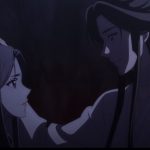

Excellent write up! As a donghua only person I’m interested to see how the tornado cliffhanger resolves, and I may have to read the novel to see the differences.
The novel is super worth the read! I highly recommend it. Thank you for reading!
Which fan translation did you quote from?
Also, I dont know Chinese but I think even though “Evil Taoist” is used in place of Guoshi when it shouldn’t be, it probably also comes from a different term that’s used for her and Fang Xin the “two evil taoists”. I don’t know why but when Fang Xin is called Guoshi it is translated as the Imperial Preceptor.
I’ve really been enjoying your reviews as another fan of the novel and I look forward to this week’s review.
Unfortunately I can’t link to it due to the dubious legality of it, but it’s a translation by someone named “Suika.” It doesn’t look like it’s from an official translator group or anything, but was made “for friends” and then shared around. While I can’t link here, you can hit me up on Twitter and it’ll be a bit less sketchy legally for me to share there 😉
And thank you so much for reading! I really appreciate it.
Thanks for your reviews! I’m a donghua only fan and I really appreciate how you explain translation differences and explain some of the details such as that of the heavenly currency – I wanted to search for that and that’s actually why I began looking for reviews since its mentioned in the first episode but I did not understand why gods needed any form of currency/credits/merits. It’s really kind of you to explain such extra information for those of us who might not know. Just to clarify, is it so that higher the number of merits, the more spiritual powers a god has? Once again, thanks for your reviews 🙂 They really help and add to my enjoyment of the donghua!
Yep, when you have more currency you are considered more powerful. It’s earned through prayers, so basically the more prayers you have the wealthier and more powerful you are.